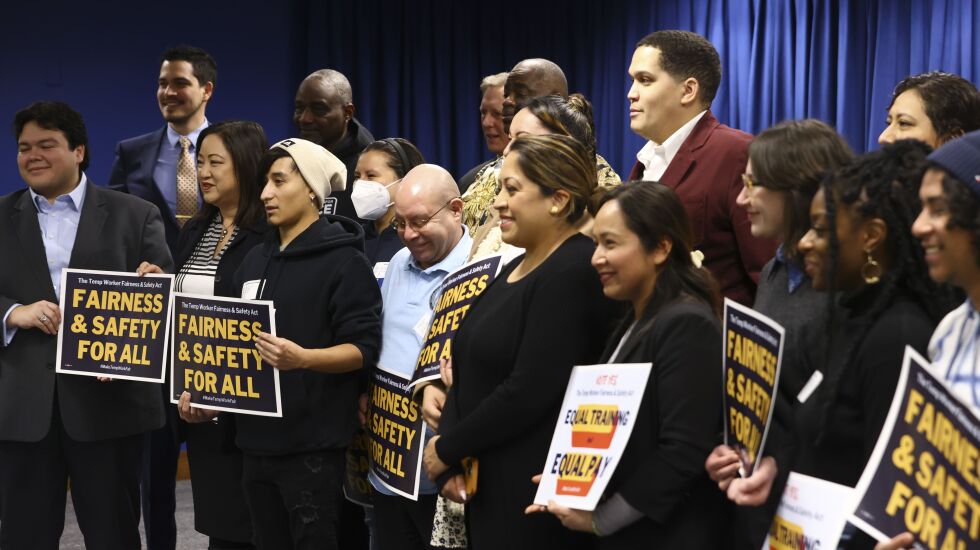
After 18 years as a temporary employee around Chicago, Brisa Chavez doesn’t feel like anyone has trained her to step into a full-time job.
Chavez is often sent to work with industrial machines, she says, without being taught how to use them. She worries this could lead to injury or death.
Complaining to the agencies sending her out on jobs can feel impossible, Chavez said.
“They want us to just let it go and keep working,” Chavez said through a translator.
State Rep. Edgar Gonzalez and state Sen. Robert Peters, both Chicago Democrats, said Monday they will introduce a bill to protect temporary workers’ rights.
The Temp Worker and Fairness Safety Act would make it easier for workers to sue temp agencies, unionize and strike, attorney Chris Williams said.
It would also make it harder for temp agencies to use noncompete clauses and other tactics to discourage workers from moving to permanent employment with a client.
“By passing this bill into law, we will set the standard for temp worker protections with the rights of workers and create meaningful pathways to union membership for every worker everywhere,” Gonzalez said.
The proposal is backed by the Chicago Workers’ Collaborative and the National Legal Advocacy Network. It’s also supported by state Rep. Theresa Mah, D-Chicago.
Peters said conversations about public safety in Chicago and statewide often exclude temporary workers’ rights. Undocumented and unhoused residents are particularly at risk for exploitation in temporary jobs, he said.
“What really brings safety is that you have money in your pocket,” Peters said. “You can pay for rent, you can put food on the table … you have health care and benefits, and you have power.”
Williams said current temporary labor conditions in Illinois aren't transparent.
“People literally don’t know where they’re going to work, how long they’ll be working, what they’ll be charged, how they’re getting there, if they’re gonna be charged for that ride,” Williams said.
Some temp agencies say existing laws offer enough protection for workers.
“Temporary agencies provide hundreds of thousands of good-paying jobs,” said Dan Shomon, a spokesman for the Staffing Services Association of Illinois. “While we have not seen the bill, there are so many laws already that protect workers. … In Illinois, we have one of the strongest laws in the country protecting temporary workers already.”
Illinois staffing firms employ about 850,000 temporary employees every year, according to the American Staffing Association. The average temporary worker in Illinois earns $38,000 a year — $4,000 less than the national average — and more than half of Illinois temps work in transportation and moving.
Communities with high rates of incarceration are also overrepresented in temp work, since it can be hard to find permanent jobs after returning from prison, said Jose Frausto, manager of leadership and advocacy at the Chicago Workers’ Collaborative.
Many temporary workers do the same tasks as their full-time colleagues, sometimes for years, without the same security and benefits, Williams said.
Chavez, the 18-year temp, said through a translator, “This problem — not transitioning from one job to another — makes us feel like agencies treat us like objects.”
Barry Rose works at an industrial bakery in Southwest Chicago, where he was first a temp for two years. Temps at the bakery spend most of their time mopping floors, he said, and aren’t taught to operate the machines where permanent employees spend their day.
“When it was time for them to clean the machines, they get mad because [temporary workers] don’t know how,” Rose said.
If passed, the bill could make it easier for temps to build a permanent work history, Rose said.
“We don’t want people to wake up and say, ‘OK, you’re fired and there’s nothing you can do,’” Rose told the Chicago Sun-Times. “Now we’ve got something behind us to fight with.”







